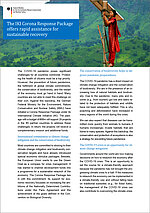Resilient forests and financing options for sustainable water supplies in the tropics
Robust forests help to preserve natural water stocks in the tropics. Together with local partner organisations, the project is developing EbA measures and innovative governance mechanisms in water catchment areas. A participative approach is being taken to the creation of ecosystem-based, sustainable land use plans. The project conducted economic assessments of the ecosystem services of the four water catchment areas and developed governance instruments aimed at integrating private-sector actors. Steps were taken to establish nature conservation measures for the reconstruction of forests, and to strengthen monitoring and local capacities in the water catchment areas. The project supported national policies and regulations for ecosystem-based approaches to climate change adaptation. Findings collated and shared with both project countries and the international community. The project was part of the IKI Corona Response Package.
- Countries
- Cuba, Dominican Republic, Guatemala, Mexico
- IKI funding
- 6,054,382.00 €
- Duration
- 01/2018 till 12/2023
- Status
- completed
- Implementing organisation
- OroVerde - Die Tropenwaldstiftung
- Political Partner
-
- Ministry of Environment and Natural Resources (MARN) - Guatemala
- Ministry of Environment and Natural Resources (SEMARNAT) - Mexico
- Ministry of Environment and Natural Resources - Dominican Republic
- Ministry of Science, Technology and the Environment (CITMA) - Cuba
- National Centre for Protected Areas (SNAP) - Cuba
- National Commission for Natural Protected Areas (CONANP) - Mexiko
- National Council of Protected Areas (CONAP) - Guatemala
- National Forestry Commission (CONAFOR) - Mexico
- Implementing Partner
-
- Centro para la Educación y Acción Ecológica, Naturaleza, CEDAE
- Fundación Defensores de la Naturaleza - Guatemala
- Pronatura Mexico A.C. - Mexico
- Unidad Presupuestada de Servicios Ambientales (UPSA) – Ministerio de Ciencias, Tecnologia y Medio Ambiente
State of implementation/results
- Project completed.
- Since 2021, the focus of the project has been on scaling up EbA measures, improving their integration into regional structures and involving private sector actors. The aim was to achieve sustainable financing of the measures, which included carrying out cost-benefit analyses of the EbA measures implemented.
- Mexico: In response to the severe forest fires, emergency reforestation of 30 additional hectares was carried out on the areas damaged by the fires. The forest protection authority of the state of Mexico donated some of the seedlings for the reforestation. In total, over 25,000 seedlings of local tree species were planted. Over the course of the project, more than 360 climate-resilient agroecological systems were created, over 445 hectares of forest were reforested and measures to regenerate degraded areas were carried out on around 360 hectares. In addition, over 1,200 people have been trained in the EbA approach and supported over the long term.
- Guatemala: The partner organization Defensores de la Naturaleza became a member of the new National Expert Group for EbA and is committed to the integration of EbA into the NDCs. In collaboration with the National Forest Institute INAB, a tree nursery with a production capacity of 40,000 seedlings was set up. Defensores de la Naturaleza presented its project work in the San Jerónimo River watershed as part of the IV National Climate Change Congress. The partner organization is active in the National Expert Group for EbA and promotes integration into the NDCs. Training on EbA for professionals led to the creation of a committee in the Guatemalan scientific system on climate change (SGCCC).
- Cuba: At the end of April 2021, there were severe forest fires in the Ojito de Agua sector, which damaged around 1,900 hectares of forest. UPSA and the Cuban Ministry of Environment began regenerating the damaged forest areas by planting native tree species based on the project's EbA plan. Despite the pandemic-related situation, several workshops on the implementation of EbA measures were held in the project communities. The successful work of the Río Toa advisory board demonstrated local governance effectiveness, and an independent advisory board for Río Jaguaní was recognized. The EbA approach in the management plans of the Alejandro de Humboldt National Park and the Cuchillas del Toa Biosphere Reserve increased the effectiveness evaluation.
- Dominican Republic: Inauguration of the new office of CONORYAQUE (Advisory Council for the Management and Conservation of the Lower Yaque del Norte River), as well as meetings with parliamentarians and business representatives (including the National Banana Producers Association) to present the analyses and proposals for the management of the watershed. Two new agroforestry systems were established and over 2,500 seedlings were planted for reforestation. The CONORYAQUE Council initiated by the project gained members and strengthened planning and implementation capacities. Regular meetings with members of parliament supported the nationwide expansion of proven measures.
Latest Update:
04/2024
Further links
Project relations
Legend:
The link has been copied to the clipboard




![[Translate to English:]](/legacy/_processed_/5/5/csm_Indien_EE_Solar_Frau_bfcf99c425.jpg)
